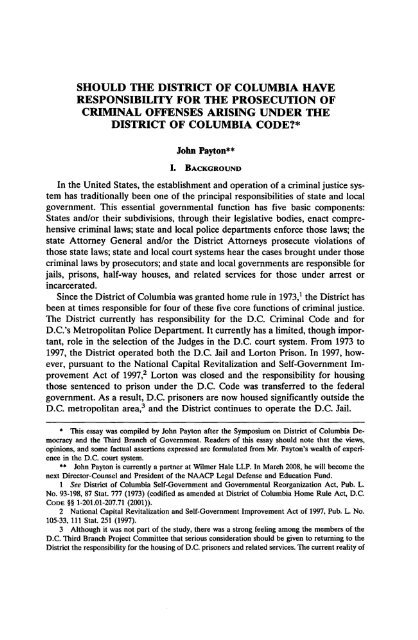Download Electronic Version - UDC Law Review
Download Electronic Version - UDC Law Review
Download Electronic Version - UDC Law Review
Create successful ePaper yourself
Turn your PDF publications into a flip-book with our unique Google optimized e-Paper software.
SHOULD THE DISTRICT OF COLUMBIA HAVE<br />
RESPONSIBILITY FOR THE PROSECUTION OF<br />
CRIMINAL OFFENSES ARISING UNDER THE<br />
DISTRICT OF COLUMBIA CODE?*<br />
John Payton**<br />
I. BACKGROUND<br />
In the United States, the establishment and operation of a criminal justice system<br />
has traditionally been one of the principal responsibilities of state and local<br />
government. This essential governmental function has five basic components:<br />
States and/or their subdivisions, through their legislative bodies, enact comprehensive<br />
criminal laws; state and local police departments enforce those laws; the<br />
state Attorney General and/or the District Attorneys prosecute violations of<br />
those state laws; state and local court systems hear the cases brought under those<br />
criminal laws by prosecutors; and state and local governments are responsible for<br />
jails, prisons, half-way houses, and related services for those under arrest or<br />
incarcerated.<br />
Since the District of Columbia was granted home rule in 1973,1 the District has<br />
been at times responsible for four of these five core functions of criminal justice.<br />
The District currently has responsibility for the D.C. Criminal Code and for<br />
D.C.'s Metropolitan Police Department. It currently has a limited, though important,<br />
role in the selection of the Judges in the D.C. court system. From 1973 to<br />
1997, the District operated both the D.C. Jail and Lorton Prison. In 1997, however,<br />
pursuant to the National Capital Revitalization and Self-Government Improvement<br />
Act of 1997,2 Lorton was closed and the responsibility for housing<br />
those sentenced to prison under the D.C. Code was transferred to the federal<br />
government. As a result, D.C. prisoners are now housed significantly outside the<br />
D.C. metropolitan area,3 and the District continues to operate the D.C. Jail.<br />
* This essay was compiled by John Payton after the Symposium on District of Columbia Democracy<br />
and the Third Branch of Government. Readers of this essay should note that the views,<br />
opinions, and some factual assertions expressed are formulated from Mr. Payton's wealth of experience<br />
in the D.C. court system.<br />
** John Payton is currently a partner at Wilmer Hale LLP. In March 2008, he will become the<br />
next Director-Counsel and President of the NAACP Legal Defense and Education Fund.<br />
1 See District of Columbia Self-Government and Governmental Reorganization Act, Pub. L.<br />
No. 93-198, 87 Stat. 777 (1973) (codified as amended at District of Columbia Home Rule Act, D.C.<br />
CODE §§ 1-201.01-207.71 (2001».<br />
2 National Capital Revitalization and Self-Government Improvement Act of 1997, Pub. L. No.<br />
105-33, 111 Stat. 251 (1997).<br />
3 Although it was not part of the study, there was a strong feeling among the members of the<br />
D.C. Third Branch Project Committee that serious consideration should be given to returning to the<br />
District the responsibility for the housing of D.C. prisoners and related services. The current reality of














